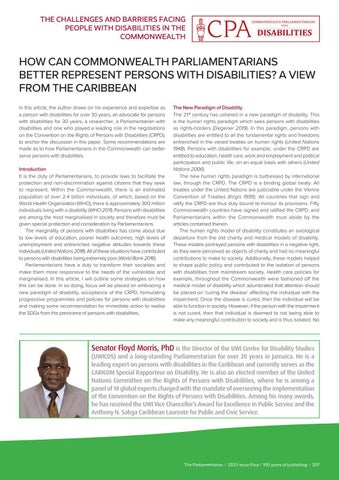THE CHALLENGES AND BARRIERS FACING PEOPLE WITH DISABILITIES IN THE COMMONWEALTH
HOW CAN COMMONWEALTH PARLIAMENTARIANS BETTER REPRESENT PERSONS WITH DISABILITIES? A VIEW FROM THE CARIBBEAN In this article, the author draws on his experience and expertise as a person with disabilities for over 30 years, an advocate for persons with disabilities for 30 years, a researcher, a Parliamentarian with disabilities and one who played a leading role in the negotiations on the Convention on the Rights of Persons with Disabilities (CRPD), to anchor the discussion in this paper. Some recommendations are made as to how Parliamentarians in the Commonwealth can better serve persons with disabilities. Introduction It is the duty of Parliamentarians, to provide laws to facilitate the protection and non-discrimination against citizens that they seek to represent. Within the Commonwealth, there is an estimated population of over 2.4 billion individuals, of which, based on the World Health Organization (WHO), there is approximately 300 million individuals living with a disability (WHO 2011). Persons with disabilities are among the most marginalised in society and therefore must be given special protection and consideration by Parliamentarians. The marginality of persons with disabilities has come about due to low levels of education, poorer health outcomes, high levels of unemployment and entrenched negative attitudes towards these individuals (United Nations 2018). All of these situations have contributed to persons with disabilities being extremely poor (World Bank 2016). Parliamentarians have a duty to transform their societies and make them more responsive to the needs of the vulnerable and marginalised. In this article, I will outline some strategies on how this can be done. In so doing, focus will be placed on embracing a new paradigm of disability, acceptance of the CRPD, formulating progressive programmes and policies for persons with disabilities and making some recommendation for immediate action to realise the SDGs from the panorama of persons with disabilities.
The New Paradigm of Disability The 21st century has ushered in a new paradigm of disability. This is the human rights paradigm which sees persons with disabilities as rights-holders (Degener 2019). In this paradigm, persons with disabilities are entitled to all the fundamental rights and freedoms entrenched in the varied treaties on human rights (United Nations 1948). Persons with disabilities for example, under the CRPD are entitled to education, health care, work and employment and political participation and public life, on an equal basis with others (United Nations 2006). The new human rights paradigm is buttressed by international law, through the CRPD. The CRPD is a binding global treaty. All treaties under the United Nations are justiciable under the Vienna Convention of Treaties (Kirgis 1995). All countries that sign and ratify the CRPD are thus duty bound to honour its provisions. Fifty Commonwealth countries have signed and ratified the CRPD, and Parliamentarians within the Commonwealth must abide by the articles contained therein. The human rights model of disability constitutes an axiological departure from the old charity and medical models of disability. These models portrayed persons with disabilities in a negative light, as they were perceived as objects of charity and had no meaningful contributions to make to society. Additionally, these models helped to shape public policy and contributed to the isolation of persons with disabilities from mainstream society. Health care policies for example, throughout the Commonwealth were fashioned off the medical model of disability which adumbrated that attention should be placed on ‘curing the disease’ affecting the individual with the impairment. Once the disease is cured, then the individual will be able to function in society. However, if the person with the impairment is not cured, then that individual is deemed to not being able to make any meaningful contribution to society and is thus isolated. No
Senator Floyd Morris, PhD is the Director of the UWI Centre for Disability Studies
(UWICDS) and a long-standing Parliamentarian for over 20 years in Jamaica. He is a leading expert on persons with disabilities in the Caribbean and currently serves as the CARICOM Special Rapporteur on Disability. He is also an elected member of the United Nations Committee on the Rights of Persons with Disabilities, where he is among a panel of 18 global experts charged with the mandate of overseeing the implementation of the Convention on the Rights of Persons with Disabilities. Among his many awards, he has received the UWI Vice Chancellor’s Award for Excellence in Public Service and the Anthony N. Sabga Caribbean Laureate for Public and Civic Service.
The Parliamentarian | 2021: Issue Four | 100 years of publishing | 357
